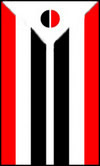Lesson Six - Part One
Inanimate Nouns and Their Plurals
Like essentially all languages, Arapaho has nouns, which are words for things, as opposed to actions or descriptions. Just as Arapaho verbs distinguish between animate and inanimate things, the nouns are divided into these two classes as well. For the moment, we will discuss only inanimate nouns.
| word | |
| cup | |
| |
name |
| bone |
The plural of these words is often formed by adding -(o)no:
| words | |
| cups | |
| names | |
| bones |
Notice that -ono is added after nouns ending in a consonant, while nouns ending in a vowel simply add -no. A second group of inanimate things forms the plural by adding a long -ii or -uu:
| treebark | plural = hinóooxuu | |
| arrow | plural = hó3ii |
There is no rule for knowing whether noun plurals involve -(o)no or -ii/-uu, you must simply memorize this information. But in almost every case, if a noun ends in a vowel, its plural will be -(o)no. For -ii and -uu, there is a rule to at least help you remember which of these two endings should be used: if the vowel in the final syllable of the noun is -o-, and the last consonant is -h-, -'-, -w-, -x- or -k-, then the plural will be -uu. If not, it will be -ii.
Here is a list of some very common nouns, and their plurals:
| NOUN | MEANING | PLURAL |
| road | ||
| story | ||
| one's body | ||
| table | ||
| chair | ||
| book, paper | ||
| bag | ||
| wood, stick | ||
| river | ||
| tipi | ||
| tipi | ||
| plum | ||
| hohe' | mountain | |
| sky | ||
| pine | ||
| willow | ||
| red willow |
There is a special set of nouns (all with final -i' or -u') which have a different plural:
| house | ||
| land, earth | ||
| day |
These nouns are almost always plural:
| food (literally 'things eaten') | |
| chokecherries | |
| money (literally 'metal ones') |
A note on spelling: notice above that the word for 'road' is written either booo or bo'o. In very slow, careful pronunciation, people say booo. But when talking more quickly or more normally, they say bo'o. You can choose to write the word either way. All words which have three consecutive vowels (niiinon / ni'inon 'tipi'; beteee / bete'e, 'dance!') can be pronounced and written either of these two ways. Also words which have /h/ plus /'/ often drop the /'/ in normal or rapid pronunciation, as: nih'oo3oo / nihoo3oo 'white person.' Again, you can spell and pronounce the word either way.

